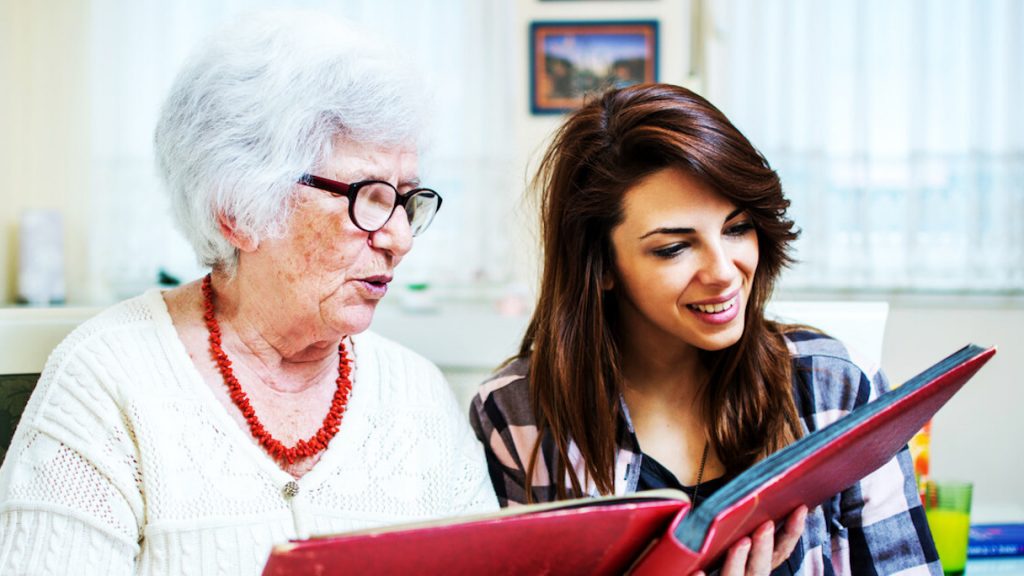
By Cara Haynes | Rewire
After months of listening to my grandpa bemoan his lack of a recorded personal family history, one day it dawned on me that maybe I could help him.
Most of his complaints centered around some expensive voice transcription technology he’d purchased. He wasn’t sure how to use it, so I volunteered to help him download the program. I thought that would be enough to get him started, and he could finish the rest on his own. I didn’t know that my involvement in this project would go far beyond that.
We downloaded the program, but it turned out that grandpa preferred telling his stories to me rather than the computer. I liked it better that way too. We used the program to record what he was saying while I asked the questions. It morphed into me coming over once or twice a week and ultimately became one of the most worthwhile things I’ve ever done.
Cracking into your family history
Although many grandparents can write their histories themselves, some need extra assistance or could benefit from outside motivation. If this is a project your grandparents have yet to complete, here are some reasons why you should help them out.
1. It’s not as much work as you think.
You don’t need to write the whole history in a single sitting. Of course, every grandparent is different, but some get tired after an hour or two.
Spending little amounts of time over a long period will make the process more manageable, and provide you with more bonding experiences that will strengthen your relationship.
Slow down, take your time, and soak up your grandparents’ stories for all they’re worth.
2. It’ll give you a new perspective on your own life.
Sometimes we get so concerned with carving our own path that we forget to look back on the path that brought us here. If your past is something you wish was different, understanding where you come from and what your grandparents were like at your age can be an incredibly eye-opening experience.
“Fostering a strong bond between grandparent and grandchild provides not only a living testimonial to history and our own unique part in it, but it also gives our lives depth and dimension through the art of storytelling,” transitional life strategist Randi Levin said.
You’ll learn more about why you are the way that you are and possibly get more insight into patterns of your life that you didn’t notice before. This is a gift that won’t always be there and that many people don’t get. If it’s available to you, take advantage of it while you can.
3. It will strengthen your relationship with your grandparents and likely other family members as well.
My grandfather played football in college, served as a secret agent during the Vietnam War, and worked for the White House. His body took a beating during all this, so most of my life I’ve seen him tired with stiff joints and a weary heart.
But hearing him speak about scaling waterfalls in Vietnam, getting in fights with bullies at school and approaching my grandma for the first time after he saw her hiding behind a newspaper brought new life to the grandpa I thought I knew. I also heard more about family members I never met, including my Great Uncle Blaine, who was brilliant, charming and died in a mining accident when he was only 17 years old, and my great grandma, who was a marvelous cook and singer who raised songbirds on her back porch.
I also heard more about my dad’s life when he was young. These included stories of traversing abandoned castles in Turkey and finding snakes in the backwoods of Massachusetts. Getting my grandpa’s perspective on my dad’s life gave me something to talk to my dad about. Seeing my dad’s eyes light up when I knew a story he hadn’t told me was something I’ll never forget.
4. With all the technology available today, you can capture their story any way you want.
If writing isn’t your thing, don’t limit yourself to that. You can make a book full of pictures with short captions or create an audio or video recording.
NanaGram founder Alex Cook started recording his grandpa’s story with a GoPro attached to the dash of his car. He asked his grandpa questions about life while they took him on trips to get him out of the house.
“It started with just errands—trips to the bank, grocery store, or barber —and quickly morphed into adventures,” Cook said. “Everywhere we went, he’d strike up a conversation with everyone he saw and then brag about his grandkids.”
Cook also recorded impromptu funny moments on his phone and texted them to the rest of his family. The work was fun, and gave Cook a deep satisfaction from recording his grandpa’s stories.
“Our elders are an important connection to the past,” he said. “A closer connection to our elders might decrease humanity’s chances of repeating its lowest moments.”
5. All you need to start is a good question.
Asking someone their life story can feel like a huge task. It might be a little awkward at first, but it doesn’t have to be. You can ease into it by asking a few questions about a photograph they have in their house or about a story you heard once but can’t remember the details.
Or you can simply be up front about it! Let your grandparents know you want to help them preserve the family history. Tell them you want something to remember them by and a chance to spend more time with them. It will be hard to argue with a proposition like that.
![]() This article originally appeared on Rewire.
This article originally appeared on Rewire.
© Twin Cities Public Television - 2018. All rights reserved.
Read Next



